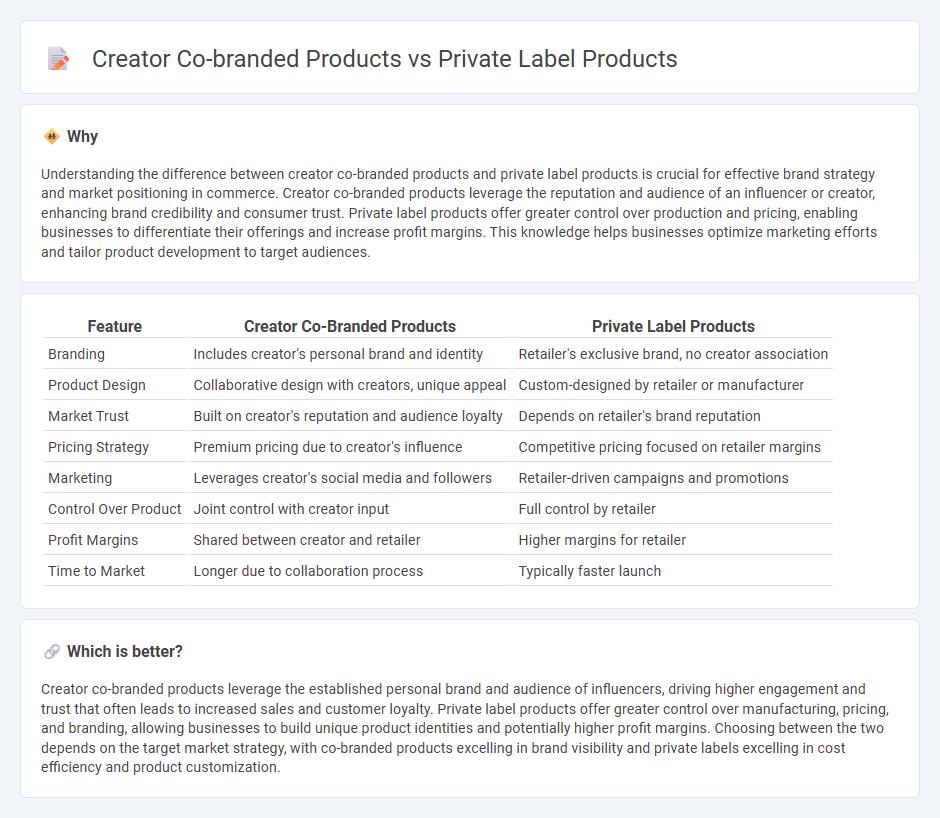
Creator co-branded products combine the unique influence of content creators with established brand credibility, driving consumer trust and increasing market reach. Private label products, produced by retailers under their own brand, offer cost-effective control over quality and pricing, enhancing profit margins and customer loyalty. Explore the advantages and strategic potential of merging creator co-branding with private label product strategies to boost commerce success.
Why it is important
Understanding the difference between creator co-branded products and private label products is crucial for effective brand strategy and market positioning in commerce. Creator co-branded products leverage the reputation and audience of an influencer or creator, enhancing brand credibility and consumer trust. Private label products offer greater control over production and pricing, enabling businesses to differentiate their offerings and increase profit margins. This knowledge helps businesses optimize marketing efforts and tailor product development to target audiences.
Comparison Table
| Feature | Creator Co-Branded Products | Private Label Products |
|---|---|---|
| Branding | Includes creator's personal brand and identity | Retailer's exclusive brand, no creator association |
| Product Design | Collaborative design with creators, unique appeal | Custom-designed by retailer or manufacturer |
| Market Trust | Built on creator's reputation and audience loyalty | Depends on retailer's brand reputation |
| Pricing Strategy | Premium pricing due to creator's influence | Competitive pricing focused on retailer margins |
| Marketing | Leverages creator's social media and followers | Retailer-driven campaigns and promotions |
| Control Over Product | Joint control with creator input | Full control by retailer |
| Profit Margins | Shared between creator and retailer | Higher margins for retailer |
| Time to Market | Longer due to collaboration process | Typically faster launch |
Which is better?
Creator co-branded products leverage the established personal brand and audience of influencers, driving higher engagement and trust that often leads to increased sales and customer loyalty. Private label products offer greater control over manufacturing, pricing, and branding, allowing businesses to build unique product identities and potentially higher profit margins. Choosing between the two depends on the target market strategy, with co-branded products excelling in brand visibility and private labels excelling in cost efficiency and product customization.
Connection
Creator co-branded products leverage the influencer's or creator's brand alongside an established company's identity to enhance market appeal and consumer trust. Private label products are manufactured by one company but sold under another retailer's brand, allowing businesses to control branding and pricing strategies directly. Both co-branded and private label products emphasize collaboration, brand equity, and targeted marketing to drive sales growth and customer loyalty in competitive commerce landscapes.
Key Terms
Branding
Private label products offer companies full control over branding, allowing customization of packaging, logos, and marketing to match brand identity, fostering strong brand loyalty. Creator co-branded products combine the established reputation of both the brand and the creator, leveraging dual branding to tap into new audiences and enhance credibility. Explore how aligning your branding strategy with product type can amplify market impact.
Ownership
Private label products are owned entirely by the retailer, allowing full control over branding, pricing, and product specifications, while creator co-branded products involve shared ownership between the creator and the retailer, leveraging the creator's brand influence. Private label ownership ensures exclusive rights and flexibility in product development, whereas co-branded offerings benefit from combined brand equity and joint marketing efforts. Explore the differences in ownership models to determine which strategy best aligns with your business goals.
Profit Margin
Private label products typically offer higher profit margins due to lower production and marketing costs, as retailers control branding and avoid retailer fees. Creator co-branded products often involve shared revenue models and licensing fees that can reduce overall profitability despite potentially higher consumer appeal. Explore detailed strategies to maximize profit margins by balancing brand collaboration and cost efficiency.
Source and External Links
15 lucrative private label products to sell - Private label products are exclusively supplied by one manufacturer allowing customization of product design, features, and packaging to align with a brand's identity, offering unique market differentiation and greater control over quality and marketing strategies.
Top 20 Private Label Products To Sell In 2025 - Private label products are custom-made goods created by manufacturers per client specifications and sold exclusively under the client's brand, enabling unique offerings, control over quality, and stronger brand identity compared to more generic white-label products.
Private label - Wikipedia - A private label product is one made by company A for company B, which then sells it under its own brand name exclusively, with specifications set by the client, distinguishing it from white-label products that are more generic and sold to multiple companies.
 dowidth.com
dowidth.com